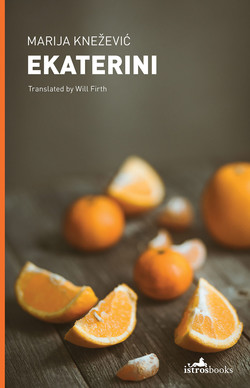Читать книгу Ekaterini - Marija Knezevic - Страница 10
На сайте Литреса книга снята с продажи.
ОглавлениеSo Bad to See You
(Starting a new life)
Here the Carpathians begin: a boundless place, for it spreads as far as the far-flung vineyards. They existed and will continue to exist long before and after all wars. Their form is elusive – every vineyard ends, or begins, at the point where the eyes weary and the sky takes over the last of the vines. Old folk are able to recognise that nuance of blue in the grapes which commingle with each other during the harvest. Only they can recognise the subtle differences in what they once called ‘the grapes from the end of the world’, while the landowners watch over every harvest hand, basket and grape. Although today, when farmers show others their properties, they have to admit: ‘Sure, it is great land, but just look at the sky!’ Gazing up at it, the poet Vasko Popa once wrote: ‘He had to die, they say. The stars were closer to him than people.’
The next stage of grandfather Stipe’s career was here, in Vršac, near the Romanian border. The area had a living a mixture of languages, and after leaving Thessaloniki and the odyssey that ensued Ekaterini thought for a moment she had miraculously returned home. But the miracle ended as soon as she began learning Serbian. There was nothing for it, she had to get a grasp of the new language, if only because of the cooking. Pata’s Cookbook was her primer. Stipe carted home food just like he used to do in Thessaloniki, and thanks to his habit of buying wholesale, several Thessaloniki families – grandmother’s closest relatives – survived the four years of that war. During another turning point of history, they in turn would save Lucija and her family. Deeds like that are never forgotten. Yet generous people, those who give gladly, don’t do it so that their kindness will be reciprocated. At least those who give from the heart; that’s simply how they are – incorrigible. Other people are born of weak character; evildoers, petty thieves and great usurpers, and that’s normal for them, that’s just how they are. Once people used to call a spade a spade, but times change; now we have pop psychology shot through with detective-story elements. Food hasn’t changed so much. Housewives still consult the old cookbooks, and there’s no generation which hasn’t had to queue for food. A heavily laden dinner table is part of tradition; hunger is individual destiny.
After his barren, stony childhood, Stipe bought food by the sackful from the start of his career till the end of his life. That godsend of a man hated no one and nothing – except hunger.
‘What this now, dear God? You crazy, husband? How I now make so much food?’ Ekaterini stumbled in her newly acquired language of the Serbs.
‘Oh, come on Kata.’
Stipe swelled with pride as he watched the miller’s boy, white with flour, carrying sacks from the heavily laden cart into the little room proclaimed pantry. ‘I’ll help you, don’t fret.’
‘But how much people is coming? This all for one feast?’
‘Whoever comes along, dear wife, will be welcome and can eat and drink his fill!’
Ekaterini felt that if she survived the preparations for St Nicholas Day she’d be entitled to beatification herself. ‘My husband is a bit crazy –,’ she grumbled in Greek, there’s a war going on, and he brings cartloads of food and drink to ply people with. And who’s going to prepare it all? Why do people eat so much? Did I get married just so as to cook?
